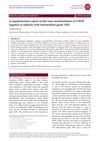 September 2023 in “IP Journal of Nutrition, Metabolism and Health Science/IP Journal of Nutrition Metabolism and Health Science”
September 2023 in “IP Journal of Nutrition, Metabolism and Health Science/IP Journal of Nutrition Metabolism and Health Science” Recognizing and managing hirsutism, alopecia, and acne is crucial for improving wellbeing in women with PCOS.
 January 2022 in “Journal of current research in food science”
January 2022 in “Journal of current research in food science” Eating healthy and exercising can help manage Polycystic Ovarian Syndrome and its related health problems.
[object Object]  January 2021 in “Journal of Scientific Research of the Banaras Hindu University”
January 2021 in “Journal of Scientific Research of the Banaras Hindu University” Lifestyle changes and medical treatment can help manage PCOS symptoms in young adults.
 January 2020 in “Asian Journal of Basic Science & Research”
January 2020 in “Asian Journal of Basic Science & Research” Nutrease powder, a high-protein, low-carb supplement, can help manage Polycystic Ovary Syndrome symptoms, regulate periods, improve ovulation, and restore fertility.
 March 2019 in “Journal of Investigative Dermatology”
March 2019 in “Journal of Investigative Dermatology” Seborrheic dermatitis is influenced by diet, genetics, and psychological factors.
 January 2019 in “ARC journal of pharmaceutical sciences”
January 2019 in “ARC journal of pharmaceutical sciences” Acne can be managed with various treatments and requires psychological support due to its emotional impact.
 January 2017 in “Springer eBooks”
January 2017 in “Springer eBooks” Eating a balanced diet with specific nutrients can help manage menopause symptoms and prevent related health issues.
 December 2013 in “Biomedical and biopharmaceutical research”
December 2013 in “Biomedical and biopharmaceutical research” Nanotechnology shows promise for better drug delivery and cancer treatment.
 November 2013 in “John Wiley & Sons, Ltd eBooks”
November 2013 in “John Wiley & Sons, Ltd eBooks” The document concludes that accurate diagnosis of male and female gonadal disorders is crucial for effective treatment and better patient outcomes.
 September 2012 in “International Current Pharmaceutical Journal”
September 2012 in “International Current Pharmaceutical Journal” CHOP chemotherapy causes many side effects but is generally well tolerated.
 February 2024 in “Oriental Journal of Chemistry/Oriental journal of chemistry”
February 2024 in “Oriental Journal of Chemistry/Oriental journal of chemistry” Eclipta alba shows promise for treating various health issues and needs more research.
[object Object] 11 citations,
January 2011 in “American journal of transplantation” Some patients developed hair loss after islet cell transplant possibly due to their immune-suppressing medications.
317 citations,
April 2018 in “Journal of steroid biochemistry and molecular biology/The Journal of steroid biochemistry and molecular biology” PCOS is a complex condition in women that can lead to health issues, and lifestyle changes are the best management approach.
 8 citations,
September 2021 in “Journal of Cosmetic Dermatology”
8 citations,
September 2021 in “Journal of Cosmetic Dermatology” Some diets and supplements might help with skin disorders, but their effectiveness varies and more research is needed.
 1 citations,
November 2023 in “Journal of ovarian research”
1 citations,
November 2023 in “Journal of ovarian research” Agaricus subrufescens improves ovarian function and biochemical health in rats with PCOS.
 1 citations,
May 2023 in “Cell reports medicine”
1 citations,
May 2023 in “Cell reports medicine” Sons of mothers with polycystic ovary syndrome (PCOS) have a higher risk of obesity and insulin resistance, possibly due to certain genes and factors passed down from their mothers.
 September 2024 in “Journal of Inflammation Research”
September 2024 in “Journal of Inflammation Research” Type 1 Diabetes prevents hair growth by causing cell death in hair follicles.
 August 2024 in “Frontiers in Nutrition”
August 2024 in “Frontiers in Nutrition” Antioxidant-rich diets may reduce hair loss risk, while pro-inflammatory diets may increase it, especially in women.
 353 citations,
February 2022 in “Nature Immunology”
353 citations,
February 2022 in “Nature Immunology” Long-haul COVID can cause lasting symptoms affecting many body systems and may be linked to ongoing inflammation and immune system issues.
63 citations,
May 2009 in “Dermato-endocrinology” Increased FGFR2b signaling, influenced by androgens, plays a role in causing acne.
 44 citations,
March 2015 in “PLOS ONE”
44 citations,
March 2015 in “PLOS ONE” Fibroblast Growth Factor-9 (FGF-9) can help improve heart function in diabetic mice after a heart attack by reducing inflammation and harmful changes to the heart's structure.
 29 citations,
October 2020 in “eLife”
29 citations,
October 2020 in “eLife” Higher testosterone levels can increase the risk of certain diseases like type 2 diabetes in women and prostate cancer in men, but can also protect against autoimmune diseases and hair loss. It also affects body fat and bone density.
 19 citations,
March 2022 in “International Journal of Environmental Research and Public Health”
19 citations,
March 2022 in “International Journal of Environmental Research and Public Health” Certain brain hormones and chemicals are linked to the development of Polycystic Ovary Syndrome.
 9 citations,
February 2022 in “Genes”
9 citations,
February 2022 in “Genes” Women with PCOS have more Bifidobacterium in their gut compared to those without PCOS.
3 citations,
October 2023 in “Cosmetics” Healthy lifestyle changes can significantly improve skin health as you age.
 2 citations,
September 2020
2 citations,
September 2020 Long-term high testosterone levels can improve bone density and reduce body fat but may increase the risk of prostate cancer and high blood pressure.

Increased free testosterone can lead to stronger bones and less body fat but also higher risks of prostate cancer, hair loss, spine issues, and high blood pressure.
 December 2024 in “Archiv Euromedica”
December 2024 in “Archiv Euromedica” Early diagnosis and personalized treatment are crucial for managing PCOS and preventing complications.
 40 citations,
November 2019 in “Frontiers in Endocrinology”
40 citations,
November 2019 in “Frontiers in Endocrinology” Metabolic Syndrome is linked to several skin conditions, and stem cell therapy might help treat them.
36 citations,
December 2014 in “F1000 prime reports” The document concludes that Hidradenitis suppurativa is often underdiagnosed, lacks definitive treatment, and requires better awareness and management strategies.

























